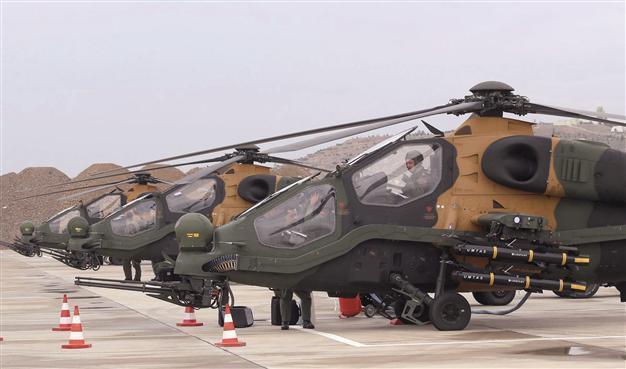Fund financing Turkish weapons deals seen growing
Burak Bekdil

DHA Photo
Turkey will increasingly rely on a special non-budgetary fund in financing its multi-billion dollar armaments programs, while budget figures for defense foresee a modest rise for 2015.
Conventionally, Turkey’s defense budget consists of government funds allocated for the Defense Ministry, the Gendarmerie force and Coast Guard. Gendarmerie and Coast Guard funds come under the Interior Ministry’s budget.
According to the 2015 budget, funds for the Defense Ministry will rise by 4.4 percent to 29.8 billion Turkish Liras next year from 28.5 billion liras this year. Some 57 percent of that budget will go to personnel spending and 41 percent to the acquisition of goods and services. The gendarmerie budget will increase to 6.5 billion liras next year from 6.2 billion liras in 2014 and the Coast Guard’s budget will rise from 452 million liras this year to 506 million liras in 2015.
The 4.4 percent rise in overall conventional defense budget compares to an 8.4 percent increase in Turkey’s overall state budget that goes up from 436 billion liras this year to 473 billion liras in 2015. The defense budget in 2014 had risen by 6.7 percent from 2013. In 2015, the defense budget will account for 6.3 percent of the overall budget, compared to 6.5 percent in 2014, marking a slight decline.
But officials and analysts agree Turkey will finance its new weapons and modernization programs through non-budgetary spending and Treasury guarantees.
The government has already announced a plan to raise up to about $5 billion from a conscription scheme to transfer that financing to a fund that sponsors procurement programs.
The plan grants exemption from conscription to all Turkish men aged older than 28 as of Jan. 1, 2015 in return for a lump sum payment of 18,000 liras (approximately $8,150). Every Turkish male citizen over 20 years of age must do compulsory military service for five to 12 months, depending on his education.
The government said there are more than 600,000 people who qualify for the scheme. A government spokesman said most of these people are expected to benefit from the paid exemption system.
If all those who entitle benefits from the system, the government will raise around $5 billion from the system and create a major source of funding for ongoing and future modernization and acquisition programs.
“The money we will collect from this exemption will directly be transferred to our Defense Industry Support Fund to be used as part of our efforts to adopt a technology-intensive army,” Prime Minister Ahmet Davutoğlu said in a speech in Parliament on Dec. 2.
Turkey’s procurement agency, the Undersecretary for Defense Industries (SSM), collects annual receipts in the Defense Industry Support Fund. The fund normally consists of revenues from levies and indirect taxes on alcohol, tobacco and gambling and had been widely speculated to go at around an annual $1 billion.
Earlier this year, the SSM said the revenues it collected from the fund totaled $1.48 billion in 2013, compared to $1.3 billion in 2006, but much less than an all-time high of $2.89 billion in 2008. More importantly, the SSM said the fund’s accrued but not yet collected revenues from the Treasury amounted to $5.7 billion as of the end of 2013.
The due payment could either be reimbursed by the Treasury in installments or the SSM can use it in the Treasury’s backing for future loans it may take.
